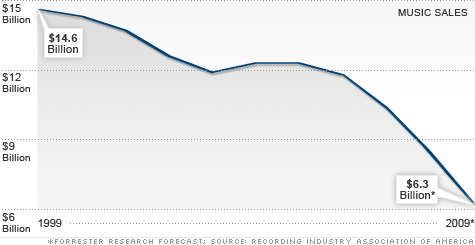Apple isn't about to destroy cable like it destroyed albums, for one simple reason: The TV business in 2012 is nothing like the music business in 2000.

Reuters
Apple wants to be in your living room. And it doesn't want to settle for being the screen in your lap while you watch TV. Apple wants to be the TV.
It's not too hard to see why. Televisions costs hundreds of dollars, and Americans love them. The typical adult spends between four and five hours watching video every day, and the vast majority of that time is spent in front of a TV. If Apple owned the TV, it could command the entire suite of screens in your life.
The possibility of dominating the screen business is reason enough for Apple to try to break into the television industry. But analysts thrilled by the idea that Apple wants to get into TV have convinced themselves that they can untie the cable bundle, and give us when-we-want-it-how-we-want-it video the same way it changed the music industry 12 years ago. But they are missing something important.
The video business in 2012 is nothing like the music business in 2000. So the iTV will be nothing like the iPod.
Apple debuted iTunes and iPods at the perfect moment -- just as the music business was getting rocked by millions of teenagers turning to downloads over albums. So, the music industry struck a controversial deal to unbundle their LPs and sell songs individually for $0.99. How did that work out? Here's a graph of music sales since 1999. Not so hot.

You're a media executive -- maybe at Disney -- and it's 2012. You know the music industry is a shadow of its former self. You partially blame iPods for expediting the decline. How excited are you about giving Apple a sweetheart deal in exchange for unbundling your channels and shows like ESPN and ABC Family in a way that might destroy your business forever?
Oh, really? Not so excited? Okay, follow-up question. How desperate are you to make up for all the money you're losing on teenagers downloading your content for free? Well, let's see, HBO's "Game of Thrones" is the most-illegally-downloaded TV show in America, and HBO subscribers are growing. That doesn't sound so disruptive. Netflix, the company that is supposedly disrupting your live-TV business, is still paying your company tens of millions of dollars a year for the rights to the shows you own. Companies and families are still paying for your content. There's no such thing as Napster for live-TV. Why in the world would you try to destroy your business model by signing a deal that could expedite the end of the cable bundle, which forces every household to pay your company for entertainment they don't even watch?
Techies are conflating the idea that Apple wants to disrupt this TV-watching business with the idea that Apple has a shot at disrupting the actual TV-video business. The fact that Apple is now in talks with cable companies to deliver video to their screen shows pretty clearly that the company has all but given up on trying to license content from media companies -- the ones who own the TV shows you watch -- because it's simply too expensive.
Still, some are holding out hope for the Holy Grail of TV disruption. These conversations "would set Apple up to gradually gain more leverage over the cable companies--until the day when Apple has enough households worldwide that it can go direct to the networks and render the cable companies dumb pipes," Henry Blodget wrote yesterday. Blodget might yet be right. A lot can happen in a few years. But today, what does Apple gain by spending billions of dollars over ten years by buying all the media content we watch and paying for the technology to host and distribute it?
Apple doesn't have to beat Comcast and FiOS to own your living room. It just has to join them.
_________
*To be clear: The Apple TV product that everybody is excited about is separate from a product that exists called (confusingly) Apple TV, a little hockey-pock device that connects your TV to the Internet and lets you play HD content from Netflix, Hulu, or the iTunes store.
No comments:
Post a Comment